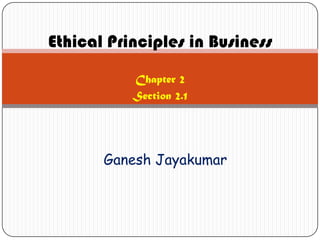
Ethical principles in business
- 1. Ethical Principles in Business Chapter 2 Section 2.1 Ganesh Jayakumar
- 2. Utilitarianism : Weighing Social Costs and Benefits
- 3. Case on Ford Motors (1970)
- 4. Cost-Benefit analysis No of cars = 12.5 million Cost of repair/car = $11 Total cost to be incurred = $137 million 180 burn deaths * $200,000 180 severe burns * $67,000 2100 burned vehicles * $700 Total = $ 49.15 million
- 5. Utilitarianism A general term for any view that holds that actions and policies should be evaluated on the basis of the benefits to the society.
- 6. Utility The inclusive term used to refer to any net benefits produced by an action.
- 7. Traditional Utilitarianism Jeremy Bentham and John Stuart Mill An action is right from an ethical point of view, iff, the sum total of utilities produced by that act is greater than the sum total of utilities produced by any other act the agent could have performed in its place. • -Utilitarian principle
- 9. Mistake 1 When the U.P. says that the right action for a particular occasion is the one that produces more utility than any other action, it doesn‟t mean most utility for the person performing the action, instead for all persons affected by the action.
- 10. Mistake 2 U.P. not only requires us to consider the direct and immediate consequences of our actions but also all foreseeable future costs and benefits that each alternative will provide for each individual, as well as any significant indirect effects.
- 11. Mistake 3 (most important) U.P. doesn‟t say that the right action is the one in which its own benefits outweigh its own costs, rather it says that, the right action is the one whose combined benefits and costs outweigh the combined benefits and costs of every other action the agent could carry out. To determine the morally correct action, we must compare the utility of all actions that one could carry out in that situation; only then can we determine which action will produce more utility than the others.
- 12. Utilitarianism Advocates maximizing utility Matches well with moral evaluations of public policies Appears intuitive to many people Helps explain why some actions are generally wrong and others generally right Influenced economics
- 13. Measurement Problems How can the utilities, diff actions have for diff ppl be measured and compared ? There are certain costs and benefits that seem almost impossible to measure ,eg: health, life. It is unclear as to what should count as a benefit and what as a cost… The utilitarian assumption that all benefits are measurable implies that all benefits can be traded for equivalents of each other i.e., we should be willing to trade any one good for some quantity of another good.(noneconomic goods concept)
- 14. • Utilitarianism is the system that holds the action on the benefits and costs they will impose on society. • Rights is an Individual entitlements to freedom of choice and well – being. • Justice is distributing benefits and burdens fairly among people.
- 15. Case… Should Companies Dump Their Wastes In Poor Countries?? Its best for every one if pollution is shipped to the country where its health effects will have the lowest cost. So it best to dump wastes in lowest wages countries. Transferring pollution into a clean environment where it will disappear rather than pollution the same place.
- 16. Pollution will cause more harm to people who have „long life span‟ rather than where people who die young, so if we dump waste in poor country we can reduce the disease in the countries where people have long life span. Pollution can cause “aesthetic” damage, such as dirty-looking air that may have very little direct health impact, this will enhance welfare enhancing between countries.
- 20. Questions?? Explain which parts of the reasoning in this memo a utilitarian would have to accept and which parts a utilitarian could reject? Do you agree or disagree with the conclusion that those wastes in rich countries should ship to poor countries?
